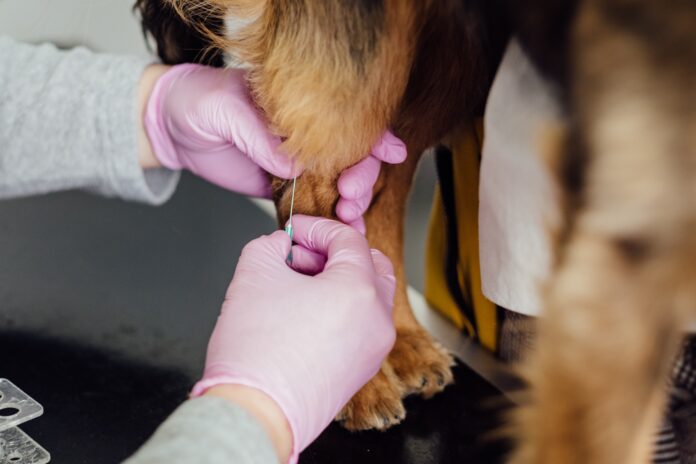In the last few decades, medical science has advanced significantly. The breakthroughs in this space have not only revolutionized how we diagnose and treat illnesses but also facilitated the development of effective veterinarian preventive healthcare measures. From disease prevention and control to the implementation of sophisticated medical procedures that help eliminate the risk of disorders or life-threatening diseases in domestic animals, veterinary healthcare has witnessed unprecedented improvements.
Advancements in genetic technology have revolutionized the field of medicine, and now they are making a significant impact on veterinary healthcare as well. Gene sequencing, also known as genetic testing or DNA testing, is becoming an invaluable tool for early disease detection in pets. Veterinarians can analyze an animal’s genetic code and identify potential health risks and genetic disorders, and even predict the likelihood of certain diseases manifesting in the future. This article explores the concept of gene sequencing for early disease detection in pets, its benefits, challenges, and the potential it holds for improving the overall health and well-being of our beloved animal companions.
Understanding Gene Sequencing
Gene sequencing involves decoding an organism’s DNA to determine its genetic makeup. It allows veterinarians to examine specific genes and their variations, which can provide valuable insights into an animal’s overall health. The technology relies on high-throughput DNA sequencing techniques that can rapidly and accurately analyze a large volume of genetic information.
Various methods, such as whole-genome sequencing, targeted gene sequencing, and exome sequencing, are employed depending on the specific requirements of the analysis. When it comes to determining genetic disorders in pets and domestic animals, the genetic code plays a crucial role. It serves as a blueprint for identifying genetic disorders in pets and domestic animals. Gene sequencing helps veterinarians analyze the genetic code, which further assists them in the following crucial steps:
- Identify genetic disorders caused by mutations or variations in specific genes and diagnose genetic diseases.
- Determine the presence of specific gene variants that are associated with inherited traits of diseases.
- Determine the increased risk or predisposition of domestic animals to certain diseases or conditions and identify gene markers to assess the likelihood of a particular disorder developing in an animal.
- Develop personalized treatment plans according to specific gene variations.
- Prevent transmission of genetic disorders and diseases to future generations.
- Develop targeted therapies and perform diagnostics tests for animals affected by genetic disorders.
Benefits of Gene Sequencing in Pets
Gene sequencing has far-reaching benefits for pets in particular and domestic animals at large. Here are some key benefits of gene sequencing in pets:
Early Disease Detection
One of the most significant advantages of gene sequencing in pets is the ability to detect diseases early. Apart from common genetic problems in pets, many genetic disorders and predispositions are not easily identifiable through physical examinations alone. Using gene sequencing, veterinarians can analyze an animal’s DNA and identify genetic markers associated with specific diseases. They can intervene proactively and provide timely treatment or implement preventive measures. Early disease detection enhances the chances of successful treatment outcomes.
Customized Treatment Plans
Gene sequencing provides veterinarians with a comprehensive understanding of an animal’s genetic predispositions. With this knowledge, veterinarians and pet owners can develop tailored healthcare plans, including preventive strategies, to manage or mitigate the risks associated with these genetic predispositions. They take into account the genetic variations in pets and develop a more personalized approach toward treatment, including the most appropriate medications, therapies, or surgical interventions.
Personalized treatment plans and precision medicine tailored according to an animal’s unique genetic makeup can enhance treatment efficacy and minimize potential adverse effects. It can also lead to better and long-lasting treatment outcomes.
Breed-Specific Screening
In pets and domestic animals, certain breeds are prone to specific genetic disorders. For instance, certain breeds of dogs are more susceptible to conditions like hip dysplasia, heart disease, or specific types of cancers. Gene sequencing allows breeders and owners to identify potential genetic risks and take preventive measures.
Making Informed Breeding Decisions
Gene sequencing paves the way for responsible breeding practices. It allows breeders to identify carriers of genetic mutations associated with certain diseases. Using genetic information, veterinarians, breeders, and pet owners can breed animals selectively without these mutations and reduce the incidence of inherited disorders within specific breeds. This knowledge aids breeders in making informed decisions to manage the health of individual animals and to avoid passing on detrimental genetic traits to future generations.
Enhanced Pet Welfare
Gene sequencing empowers veterinarians and pet owners with valuable information that supports proactive healthcare management. When veterinarians identify potential health risks early on, they can initiate appropriate preventive measures, such as dietary adjustments, lifestyle modifications, and regular monitoring. This proactive approach improves animal welfare by preventing the development or progression of certain diseases and promotes a healthier and happier life for pets.
Advancing Veterinary Medicine
Gene sequencing in pets not only benefits individual animals but also contributes to the advancement of veterinary medicine as a whole. The data generated from gene sequencing pets can contribute to ongoing research efforts. Large-scale genetic studies involving various animal populations help scientists understand the genetic basis of diseases, uncover new therapeutic targets, and develop novel diagnostic tools. These advancements benefit not only the veterinary field but also have implications for human health research.
Gene Sequencing – Challenges and Considerations
While gene sequencing holds immense promise for early disease detection and prevention in pets, several challenges need to be addressed:
Higher Costs
Currently, gene sequencing for pets can be expensive, making it inaccessible for many pet owners. As the technology evolves and becomes more widely adopted, costs are expected to decrease, allowing for broader accessibility.
Ethical Considerations
The use of gene sequencing raises ethical questions, such as privacy concerns and the potential misuse of genetic information. Clear guidelines and regulations need to be established to protect the privacy of pet owners and ensure the responsible use of genetic data.
Interpretation of Results
Gene sequencing generates vast amounts of data that require expertise to interpret the data accurately and provide precise recommendations. Veterinarians need proper training and resources to analyze and understand the results effectively to ensure reliable diagnoses and develop appropriate treatment plans.
The Future of Gene Sequencing in Veterinary Medicine
As gene sequencing technology advances, its applications in veterinary medicine will likely expand. Here are some areas where gene sequencing may have a significant impact in the future:
Development of Novel Therapies
Genetic information obtained through sequencing can guide the development of targeted therapies for specific genetic disorders. As genetic studies continue to advance and unveil the underlying genetic mechanisms, researchers can work towards developing treatments that address the root cause of the disease, potentially leading to more effective and less invasive therapies.
One Health Approach
The knowledge gained from gene sequencing in pets can have implications beyond veterinary medicine. Comparative studies between animal and human genomes can uncover shared genetic factors and provide insights into human diseases. This cross-disciplinary approach, known as One Health, has the potential to benefit both animals and humans by advancing medical research and treatment options.
Final Thoughts
Gene sequencing has opened up new possibilities in veterinary medicine by enabling early disease detection, customized treatment plans, and breed-specific screening in pets. While there are challenges to overcome, the potential benefits are far-reaching and future opportunities are boundless. As technology advances and becomes more accessible, gene sequencing will continue to play its role in revolutionizing preventive care and improving the health and well-being of our beloved animal companions.











